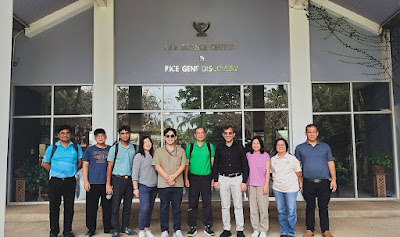IRRI and Kasetsart University researchers collaborate on sustainable rice production, with a focus on reducing agricultural greenhouse gas emissions and food security in the face of climate change.
Kamphaeng Saen, Thailand, 8 February 2025— A team of researchers from the International Rice Research Institute (IRRI) visited the Rice Science Center at Kasetsart University, Kamphaeng Saen Campus to explore collaborative research activities in climate-smart rice production.
Led by Dr. Virender Kumar and Dr. Nguyen Van Hung with IRRI Thailand Office scientists Dr. Janejira Thospornsampan, Dr. Rujirat Wongchandaeng, and Vorayuth Pakachaipong, the delegation was warmly received by the Director of the Rice Science Center Associate Professor Dr. Siwaret Arikit and his colleagues.
The visit focused on advancing sustainable agricultural practices, particularly through long-term experiments evaluating the impact of different crop management techniques on greenhouse gas (GHG) emissions and soil health. The discussions emphasized the need for science-based solutions to enhance rice production while mitigating environmental impacts.
The IRRI researchers engaged in field observations and examined rice variety cultivations that integrate innovative approaches to sustainability. The team also visited experimental plots designed to assess the long-term effects of water management, soil amendments, and crop rotations on methane and nitrous oxide emissions. The intended research includes four-year field trials, GHG measurement chambers, and evaluations of yield, soil health, and sustainability indicators.
The delegation also toured the Rice Science Center’s laboratory, where they were introduced to advanced analytical equipment used for DNA purity testing, biochemical and nutritional analysis, and physical grain quality screening, among others. Dr. Siwaret Arikit’s team showcased a high-throughput plant genotyping facility, where marker-assisted selection, gene pyramiding, and genomic selection are actively used. The demonstrations highlighted the role of laboratory research in complementing field studies to develop more effective climate-smart rice technologies.
Did you know?
- High-throughput genotyping is a method for rapidly analyzing many genetic samples.
- Marker-assisted selection (MAS) is a technique that uses genetic markers to select plants with desirable traits.
- Gene pyramiding is the process of combining multiple beneficial genes into a single plant variety.
- Genomic selection is a breeding method that uses genome-wide markers to predict and select the best plants.
The partnership between IRRI and Kasetsart University strengthens efforts toward climate-resilient and low-emission rice production research in Thailand and represents a stepping stone in supporting Thailand’s commitment to reducing agricultural emissions as part of its Nationally Determined Contributions (NDCs) under the Paris Agreement. The visit also provided an opportunity for IRRI and the Rice Science Center of Kasetsart University researchers to discuss future collaborations in scaling up climate-smart rice technologies across Southeast Asia.
By combining expertise in rice breeding or genotyping for smart-rice technologies, the institutions aim to strengthen regional efforts in sustainable rice production that support evidence-based policymaking, food security, and farmer-friendly climate adaptation strategies.
###
Learn more about IRRI (www.irri.org) or follow us on social media and networks (all links down the right column).




No comments:
Post a Comment